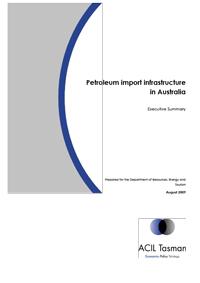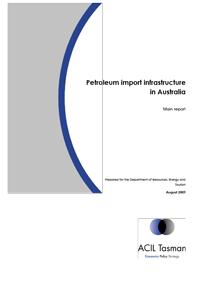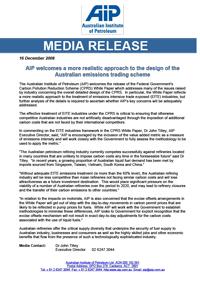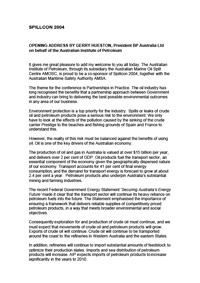Resources
Date
Description
Australia’s import, terminal and storage capacity for transport fuel has increased over time to meet growth in fuel demand There has been significant investment in new and expanded storage and terminal facilities over recent years to meet demand growth in key regional centres, as evidenced in…Date
Description
Subsidising domestic alternative fuel production is not necessary for energy security The reliable supply of conventional transport fuels (petrol, diesel and jet fuel) to the Australian market is underpinned by a diversity of supply options for petroleum products from domestic refiners and…Date
Description
Australia has robust emergency response plans and arrangements Industry and governments fully recognise the potential impacts of a severe national shortage of fuel supplies to business and consumers. Australia has robust response plans for managing a national liquid fuel emergency, which…Date
Description
All fuel users need to analyse and understand their own fuel use and to consider how best to manage the potential impacts of reduced fuel supply Many larger fuel users only hold limited stocks on the expectation that stocks will be held by fuel suppliers, or indeed governments will intervene…Date
Description
The Federal Government has introduced regulation of the quality of petrol and diesel fuel in Australia. The principal drivers of the fuel quality regulation are environmental. The adoption of emerging vehicle engine and emission control technologies is a key strategy in the management of ambient… ,
, 
Date
Description
ACIL Tasman, on behalf of the Federal Department of Resources, Energy & Tourism, has completed a comprehensive Audit of terminals suitable for importing petroleum products into Australia. The findings of the Audit are outlined in ACIL's Tasman's report - 'Petroleum Import Infrastructure in…
Date
Description
The Australian Institute of Petroleum (AIP) welcomes the release of the Federal Government's Carbon Pollution Reduction Scheme (CPRS) White Paper which addresses many of the issues raised by industry concerning the overall detailed design of the CPRS. In particular, the White Paper reflects a more…Date
Description
The Executive Director of AIP, Dr John Tilley said "the release of the report by the Prime Minister's Emissions Trading Task Group provides a considered basis for the Australian community to increase its efforts to respond to the climate change challenge. This report outlines a clear set of…
Date
Description
The Australian Institute of Petroleum today welcomed delegates to Spillcon 2004, the premier Marine Oil Spill Response conference in the Southern Hemisphere. The conference is sponsored by the Australian Marine Oil Spill Centre (AMOSC) and the Australian Maritime Safety Authority (AMSA). In…Date
Description
The Australian Institute of Petroleum (AIP) said today that new quality standards for petrol and diesel, announced by the Minister for the Environment and Heritage, Senator the Hon Ian Campbell, will improve urban air quality. AIP Executive Director, Dr John Tilley said, "AIP members support the…